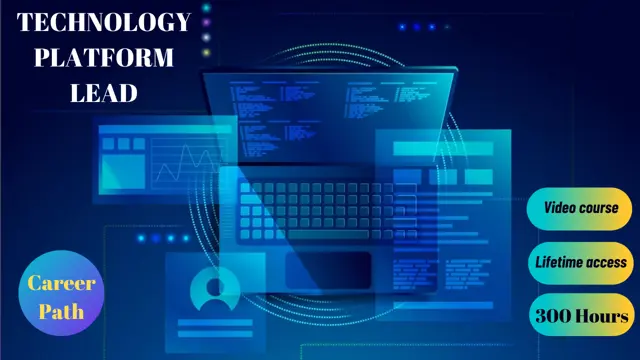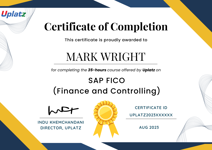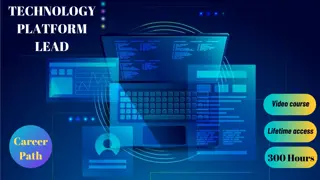
Technology Platform Lead Career Path
Self-paced videos, Lifetime access, Study material, Certification prep, Technical support, Course Completion Certificate
Uplatz
Summary
- Uplatz Certificate of Completion - Free
Add to basket or enquire
Overview
Uplatz provides this powerful and extensive Career Path program to help you become a Technology Platform Lead. It is a program covering all topics related to technology and cloud infrastructure in the form of self-paced video tutorials. You will be awarded Course Completion Certificate at the end of the course.
Technology Platform Lead career path program consists of the following courses:
- Introduction to DevOps
- Cloud Computing Basics
- Microsoft Azure Fundamentals
- CISSP
- Git and GitHub
- Maven
- JUnit 5
- Log4j
- Software Performance Engineering and Multicore Programming
- Performance Testing with LoadRunner
- Oracle 21c DBA
- SQL Programming with MySQL Database
- API Design & Development
- Business Intelligence for Beginners
- Leadership and Management
- Cost and Management Accounting
- Product Management
A Technology Platform Lead is a role within an organization that typically involves overseeing and managing the technological infrastructure and platforms used by the company. This role is crucial for ensuring that the organization's technology stack is efficient, reliable, and aligned with its business objectives. Here are some key responsibilities and functions associated with a Technology Platform Lead:
Platform Strategy: Develop and execute a technology platform strategy that aligns with the organization's goals and objectives. This may involve assessing current platforms, identifying opportunities for improvement, and planning for future technology needs.
Platform Selection: Choose the appropriate technology platforms and tools for various functions within the organization, such as data storage, cloud services, software development, and more. Evaluate potential vendors and solutions to make informed decisions.
Architecture and Design: Define the architecture and design principles for the technology platforms to ensure scalability, security, and performance. Work with architects and engineers to implement best practices.
Platform Development: Oversee the development and customization of technology platforms, ensuring they meet the organization's requirements and standards. This may involve working with software developers, data engineers, and other IT professionals.
Integration: Manage the integration of various platforms and systems to ensure seamless data flow and communication between different parts of the organization. Integration may involve APIs, middleware, or custom solutions.
Security and Compliance: Ensure that technology platforms adhere to security best practices and compliance requirements, especially in industries with strict regulations (e.g., healthcare, finance). Implement security measures and monitor for vulnerabilities.
Performance Optimization: Continuously monitor and optimize the performance of technology platforms to ensure they meet or exceed service level agreements (SLAs) and user expectations.
Budget Management: Develop and manage budgets for technology platform initiatives, including hardware, software licenses, cloud services, and personnel. Strive for cost-effectiveness and efficient resource allocation.
Vendor Management: Collaborate with third-party vendors and service providers to negotiate contracts, monitor service levels, and ensure that vendors deliver on their commitments.
Team Leadership: Lead a team of technology professionals, including engineers, administrators, and support staff. Provide mentorship, set objectives, and facilitate professional growth.
Problem Solving: Address technical challenges and issues as they arise, making timely decisions to resolve them and minimize disruptions to the organization's operations.
Stakeholder Communication: Communicate effectively with internal stakeholders, such as executives, department heads, and end-users, to understand their technology needs and keep them informed of platform-related developments.
Innovation: Stay updated on emerging technologies and trends, evaluating their potential impact on the organization. Identify opportunities to leverage new technologies for competitive advantage.
Course media
Description
A successful Technology Platform Lead plays a pivotal role in enabling an organization to leverage technology effectively, stay competitive, and achieve its strategic objectives. This role requires a blend of technical expertise, leadership skills, strategic thinking, and the ability to adapt to evolving technology landscapes.
Becoming a Technology Platform Lead requires a combination of education, experience, technical skills, and leadership qualities. Here are the steps you can take to work toward this role:
Educational Background:
- Start with a strong educational foundation. Many Technology Platform Leads hold bachelor's or master's degrees in computer science, information technology, engineering, or a related field. Some may also have degrees in business or management, especially if they aim for leadership roles.
Gain Relevant Experience:
- Begin your career in technology-related roles to gain practical experience. Consider positions such as software developer, system administrator, or IT analyst. This hands-on experience will provide a solid foundation for understanding technology platforms.
Develop Technical Skills:
- Acquire in-depth technical knowledge in areas such as cloud computing, data management, cybersecurity, network architecture, and software development. Familiarize yourself with a variety of platforms and technologies, both mainstream and emerging.
Project Management Experience:
- Technology Platform Leads often oversee complex projects. Developing project management skills, such as planning, budgeting, and team coordination, will be valuable in this role.
Leadership and Soft Skills:
- Develop leadership qualities, including effective communication, decision-making, problem-solving, and the ability to motivate and manage teams. Soft skills like adaptability, collaboration, and strategic thinking are also crucial.
Certifications:
- Consider obtaining relevant certifications to validate your expertise. For example, certifications in cloud computing (e.g., AWS Certified Solutions Architect, Microsoft Certified Azure Administrator), project management (e.g., PMP, PRINCE2), or cybersecurity (e.g., CISSP) can enhance your credentials.
Networking:
- Build a professional network within the tech industry. Attend conferences, seminars, and meetups to connect with peers, mentors, and potential employers. Networking can open doors to job opportunities and provide valuable insights.
Continual Learning:
- Stay updated with the latest trends and technologies in the tech industry. Technology is constantly evolving, so continuous learning is essential to remain relevant.
Seek Leadership Roles:
- As you gain experience, actively seek out roles with increasing responsibility. Positions like IT manager, team lead, or project manager can provide valuable leadership experience.
Advanced Education (Optional):
- Consider pursuing an advanced degree, such as an MBA, to develop a broader understanding of business and management principles. This can be particularly helpful if you aspire to lead technology teams at a strategic level.
Build a Portfolio:
- Document your achievements, projects, and contributions. A well-organized portfolio can demonstrate your skills and experience to potential employers.
Apply for Technology Platform Lead Roles:
- Once you have the requisite experience and skills, start applying for Technology Platform Lead positions. Tailor your resume and cover letter to highlight your leadership, technical expertise, and relevant accomplishments.
Prepare for Interviews:
- Be prepared to discuss your technical knowledge, leadership experience, and how you've contributed to technology platforms in your previous roles. Showcase your problem-solving abilities and your vision for technology within an organization.
Continuous Improvement:
- After becoming a Technology Platform Lead, continue to grow and evolve in the role. Seek feedback, mentorship, and additional training as needed to excel in your leadership position.
Becoming a Technology Platform Lead is a journey that involves both technical and leadership development. It's important to be patient and persistent in pursuing your career goals, as it may take time to reach this level of responsibility and leadership within an organization.
Who is this course for?
Everyone
Requirements
Enthusiasm and determination to achieve your goals!
Career path
- Technology Platform Lead
- Technology Platform Manager
- Platform Architect
- Platform Engineering Manager
- Cloud Platform Lead
- Data Platform Lead
- Infrastructure Platform Lead
- Enterprise Platform Manager
- Digital Platform Lead
- Application Platform Lead
- Platform Operations Manager
- Platform Strategy Manager
- Technology Platform Consultant
- Platform Product Manager
- Technical Lead
- Chief Technology officer (CTO)
Questions and answers
Currently there are no Q&As for this course. Be the first to ask a question.
Certificates
Uplatz Certificate of Completion
Digital certificate - Included
Course Completion Certificate by Uplatz
Reviews
Currently there are no reviews for this course. Be the first to leave a review.
Legal information
This course is advertised on reed.co.uk by the Course Provider, whose terms and conditions apply. Purchases are made directly from the Course Provider, and as such, content and materials are supplied by the Course Provider directly. Reed is acting as agent and not reseller in relation to this course. Reed's only responsibility is to facilitate your payment for the course. It is your responsibility to review and agree to the Course Provider's terms and conditions and satisfy yourself as to the suitability of the course you intend to purchase. Reed will not have any responsibility for the content of the course and/or associated materials.



